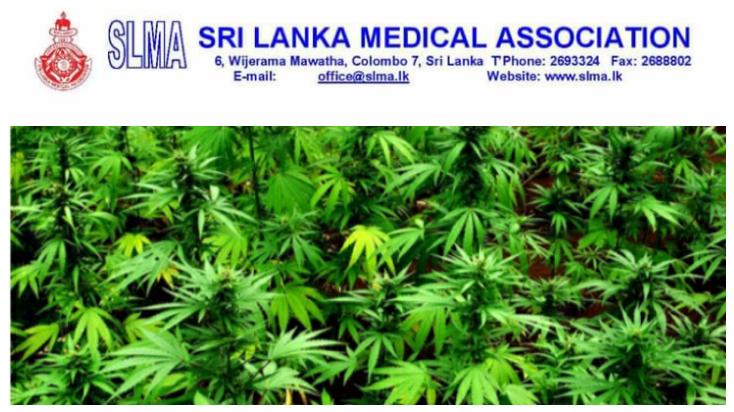
SLMA reveals their position on attempts to legalize cannabis cultivation in SL
by Sri Lanka Medical Association
There have been several news items and social media posts concerning cannabis, advocating legalization of its cultivation.
We are very concerned about these public statements promoting cannabis cultivation.
In parallel, many social media posts and videos promote cannabis use as a liberating traditional cultural practice of Sri Lanka with health benefits. Similarly there is an immense pressure internationally to legalize cannabis for recreational use.
Cannabis cultivation and use is prohibited by the Poisons, Opium and Dangerous Drugs Ordinance of Sri Lanka. It is also classified as a dangerous drug in international conventions dealing with drugs – The Single Convention on Narcotic Drugs of 1961 and the United Nations Convention Against Illicit Traffic in Narcotic Drugs and Psychotropic Substances of 1988.
However, permission has been given for its medical use in Sri Lanka, as it is component of some Ayurvedic medicines. There is a long established system in place for cannabis to be provided to licenced Ayurvedic Practitioners by the Ayurvedic Department and the Government Administrative Network. Therefore there is no requirement to legalize the cultivation of Cannabis.
If there is a shortfall in supply to the Ayurvedic practitioners, the government can look at options such as importing the shortfall, under very strict conditions. If cultivation is allowed, there will most certainly be leakage of cannabis to the general public.
Only two out of over 193 UN member countries and some states or districts in a few other countries has legalized recreational use of cannabis.
What followed such legalization is the establishment of large cannabis production and retail companies that are now aiming to become multinationals. Powerful multinational tobacco and alcohol companies have already become partners of such companies investing billions of dollars in them. Young people in North America is already using cannabis through electronic smoking devices. The alcohol industry and the beverage industry is already experimenting with cannabis based products.
These commercial products use genetically modified cannabis plants or synthetic chemicals similar to the ones in cannabis plants to ensure that very high levels of these chemicals can be ingested by the users. When multinationals move in or commercial cannabis cultivation occur there will be no room for tradition varieties of the plant, as imagined by those promoting cannabis as a local product in Sri Lanka.
We should also be concerned because cannabis is already the most widely used psychoactive product in Sri Lanka and the world. It is also the most commonly used illegal drug by young people around the world. Despite claims of medical benefits, there are only a few illnesses that respond to cannabis-based medicines. Other medicines for such aliments are already available and is prescribed widely.
Just because some chemical in a substance has some effect in treating an illness does not mean that that recreational use of this substance should be allowed to be promoted. For example,
extracts of the poppy plant and its chemical derivatives are widely used as pain relieving medicines around the world. This does not mean that heroin, which is also derived from the same plant should be promoted for recreational use by entire populations.
On the contrary, there are many health harms of cannabis including mental disorders such as depression and schizophrenia, cannabis use disorders and serious lung aliments. It also affects brain development of adolescents. It has also been associated with self-harm and suicide as well as road traffic accidents which already major killers in Sri Lanka. Sri Lankans do not deserve to be cursed with more suicides and road accidents.
We will see also see these cannabis-related conditions increase as well as other illnesses emerging when high concentrations of cannabis-based chemicals in commercial products are ingested by a larger number of people.
We, therefore, request earnestly from the government of Sri Lanka to take all steps to reduce consumption of cannabis in Sri Lanka, and not allow relaxation of measures currently in place to do so.
We also request that the laws prohibiting promotion of banned substances should be applied to social media and other promoters of cannabis, who are working over-time to promote cannabis use.
This group also harshly attacks those who promote public health and public safety in opposition to their views.
Sri Lanka is already excessively burdened with harms of alcohol and tobacco, which are legal addictive substances and heroin which is illegal. We should not add to this massive burden. If any form of further legalization of cannabis happens in the country it will be a major victory for an emerging killer industry and a resounding social and economic defeat to all Sri Lankans.


